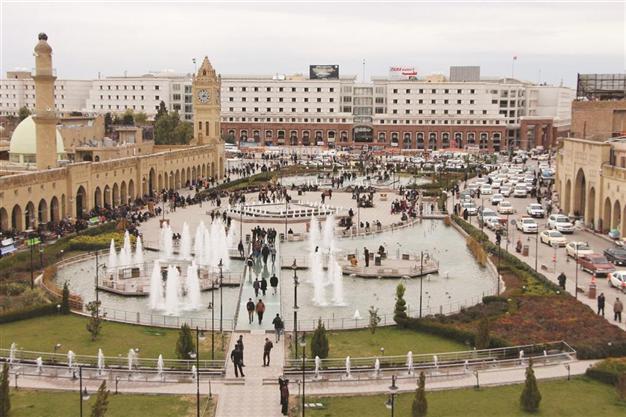Turkey to ‘boost’ social integration with Northern Iraq
SULAYMANIYAH - Hürriyet Daily News

A general scene from the Arbil city is seen in this photo. The city has seen an increasing interest from investors. DHA photo
Northern Iraq and Turkey are set to grow closer in social terms in the near future, Ankara’s top diplomat in the Kurdish region has said, noting that the two polities’ convergence was not merely limited to the economic sphere.“Human rapprochement has been building our common future. These relations with Iraqi Kurdistan will continue getting deeper despite the challenges in the region,” Aydın Selcen, Turkey’s first ever consul general to Arbil, said April 21, while addressing the “Female Journalists Media Workshop” organized by the Medialog Platform in Sulaymaniyah.
Selcen referred to a landmark visit by Prime Minister Recep Tayyip Erdoğan to Arbil during which he advanced the goal of “social and economic integration between Turkey and its neighbor northern Iraq.”
While underlining the significance of the energy cooperation with the Kurdistan Regional Government (KRG), Selcen, nonetheless, said social cooperation was as important as economic ties.
“The basic elements of that cooperation are our schools, hospitals and media organizations here,” Selcen said. The number of students at Işık Schools in northern Iraq has reached 12,000, Selcen said, adding that the İhsan Doğramacı Bilkent Arbil College has been giving education there for three years.
Dramatic change
Turkey once deemed the KRG an existential threat, but Ankara has made a profound about-face in recent years, embarking on economic and social rapprochement with Iraqi Kurds. The nature of bilateral relations between Ankara and Arbil has dramatically changed, with Erdoğan opening the consulate-general in Arbil, the de facto capital of the region, during a historic visit in March 2011. Around a decade ago, particularly following the U.S.-led invasion of Iraq, Turkey severely slammed the regional administration in northern Iraq for allegedly harboring the outlawed Kurdistan Workers’ Party (PKK).
In more recent times, Deputy Prime Minister Ali Babacan of Turkey described northern Iraq as “economically natural extension of Turkey.” Turkey’s investments in the KRG region, the trade figures between the two sides, and energy projects between Ankara and Arbil, all contribute to the growing links, Anatolia news agency quoted Babacan as saying after an International Monetary and Financial Committee (IMFC) meeting held in Washington between April 18 and 20.
Turkey’s rapprochement with the regional administration of President Masoud Barzani comes at the expense of straining its bilateral relations with the central government in Baghdad.
Resource-hungry Turkey has irritated Baghdad by wooing Iraqi Kurds, who are at loggerheads with the central government over how to exploit the country’s oil reserves and share the revenues.
















